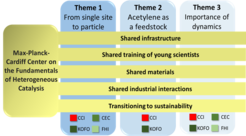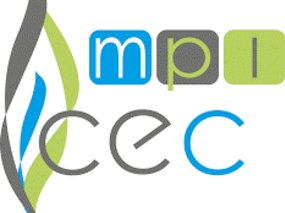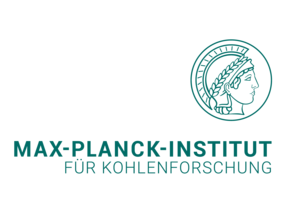Max-Planck-Cardiff-Center „FUNCAT - Fundamentals of Heterogeneous Catalysis”
The Max-Planck-Cardiff-Center FUNCAT is a joint activity between three Max-Planck-Institutes ((Chemical Energy Conversion (CEC), Fritz-Haber-Institute (FHI), and Kohlenforschung(KOFO)) and the Cardiff Catalysis Center (CCI). It was established in 2020 with the vision to stronger integrate the catalysis activities of the four entities. The scheme below gives an overview over joint activities.

The scientific thrust of the MPCC FUNCAT is broad, since the participating groups contribute highly complementary expertise. Different synthetic approaches and corresponding applications are combined under the topic “From single site to particle”. Synthesis methods include the conventional ones non in heterogeneous catalysis, but also unconventional techniques, such as thin film methods and mechanochemical approaches. The catalysts are applied in various reactions, for instance CO2 hydrogenation, acetylene conversion, and dehydrogenation of light alkanes. The topic “Acetylene as a feedstock” can be uniquely addressed by FUNCAT, since the combination of setups and expertise for acetylene hydrochlorination and hemihydrogenation at atmospheric pressure and low acetylene combinations, available at the CCI, and the high pressure acetylene capabilities for oligomerization and hemihydrogenation at high acetylene pressure at KOFO are probably not available anywhere else in the world. Also the possibilities to study the “Importance of dynamics” of surface reactions, both with experimental methods and theoretical approaches are probably unique.
The thrust of FUNCAT in working on a transitioning to sustainability has recently bee described in a joint publication in Angewandte Chemie: M. Bowker, S. DeBeer, N.F. Dummer, G.J. Hutchings, M. Scheffler, F. Schuth, S.H. Taylor and H. Tuysuz “Advancing Critical Chemical Processes for a Sustainable Future: Challenges for Industry and the Max Planck-Cardiff Centre on the Fundamentals of Heterogenous Catalysis (FUNCAT)” Angew.Chem.Int.Ed. 61 (2022), DOI: 10.1002/anie.202209016




